Big win in Mini Transat production class
Published on November 15th, 2019
(November 15, 2019; Leg 2; Day 14) – At 16:31 UTC today, Ambrogio Beccaria took the second leg win in the Mini 6.50 production boat category of the Mini-Transat, completing the 2700 nm Atlantic crossing from Las Palmas de Gran Canaria to Le Marin in Martinique in 13 days, 01 hour, 58 minutes and 48 seconds of racing.
Not content with having dominated the race from beginning to end in the production fleet, Ambrogio and his 2018 Verdier-POGO 3 also managed to keep pace with the very best of the prototypes to finish 3rd overall.
Having already secured victory in the first leg, the Italian sailor, who was participating in the event for the second consecutive time, finishes the event as the outright champion of the production category in this 22nd edition.
“I’ve been working towards this for the past five years,” said Beccaria. “I feel very emotional. That’s it now, I’ve done it! I haven’t got a true grasp of what’s happened yet, it’s really a dream come true. I was leading the whole time, but out on the water it wasn’t easy.
“The first week was very intense. I didn’t think we’d be able to push so hard! I said to myself that we really were a group of nutcases to enjoy hurting ourselves to this extent. In fact, it’s a mixture of pain and pleasure. A lot of physical suffering was involved.
“We were underwater for a week. We’re not fish. The human body isn’t designed for that. Fortunately the next stage of the race was a little calmer, otherwise I don’t know how I’d have held out… I was able to think about the man and not just the boat, which was a dictator (laughs).
“It was a positive sign to have the status of favourite at the start. However, on the flipside of that I was putting a lot of pressure on myself too. However, I handled the pressure. I came here to win and I’d have been disappointed not to achieve that. It’s great to have made it here to Le Marin. I don’t know why but it’s a lot more beautiful than it was two years ago There must be a reason for that (laughs)!”
Ambrogio finished 26th production boat in 2017.
“We set off with big winds and seas,” he continued. “Everyone got a bit frightened in Las Palmas. My coach often says that you need to be the first to reduce your sail area but also the first to hoist it. So I attacked hard and the boat was incredible in the breeze; she’s a plane! I got into the rhythm. My boat is simple. I reckon they must have frightened themselves more in the prototype fleet. I didn’t think it would be possible to compete with the top prototypes.”
Ambrogio admits that while his performance was strong, it was not without risks. “I did a massive broach where I bent by bowsprit, but miraculously it’s still there! It scared me. I said to myself that things could very quickly go pear-shaped. Victory can slip through your fingers in 20 seconds. Even though I knew that I had a big lead, I always had it in the back of my mind that anything can happen in offshore racing at any time and make you start everything from scratch.”
Yesterday it was confirmed that François Jambou won the second leg in the Mini 6.50 prototype category to make Jambou the outright champion in the proto class of this 22nd edition.
Event details – Entry list – Tracker – Facebook
The biennial Mini-Transat La Boulangère has competition for the Mini 6.50 Class in two divisions: the prototypes and the production boats.
Production boats are built out of fiberglass, have alloy masts, 1.6 meter draft, and prohibit material such as titanium, carbon fiber, and epoxy resin. Ten boats must have been built to qualify as an official production boat.
Prototypes, on their side, are free of these restrictions and have been, for years, the very first laboratory for sailing innovations. Canting keels, daggerboards, swinging wing masts, long poles for huge spinnakers, have been tried first on minis. New hull shapes with very wide waterlines and foils are the now the latest innovations.
Race Format:
Eighty-seven started the first leg on October 5 (delayed from September 22 due to storms) from La Rochelle, France and extends 1350 nm to Las Palmas de Gran Canaria. After an often complicated exit of the Bay of Biscay, sailors will expect some long slips down the Portuguese coast before arriving after 7 to 10 days in the Canary archipelago.
Eighty-two started the second leg on November 2 from Las Palmas de Gran Canaria and will take from 15 to 20 sailing days to complete the 2700 nm course and reach Le Marin in Martinique, French West Indies. Due to the numerous islands, the restart from the Canary can be tricky before reaching the famous trade winds that offer a long downwind run.
Source: Effetsmer


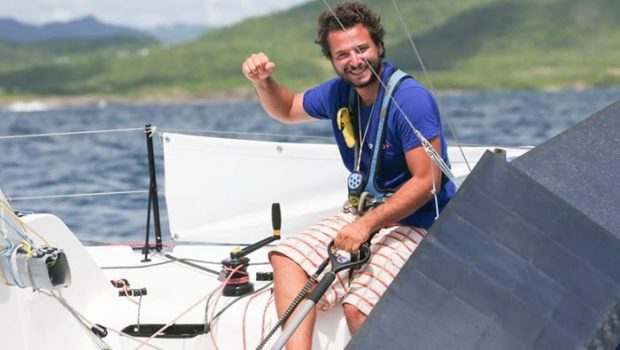



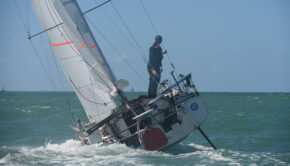
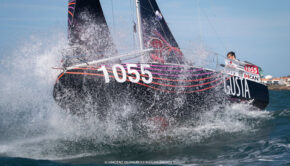
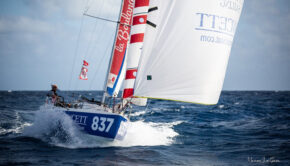
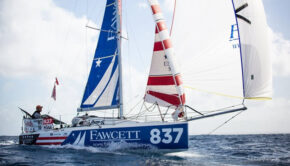
 We’ll keep your information safe.
We’ll keep your information safe.